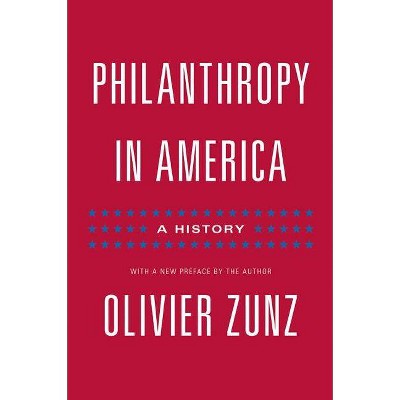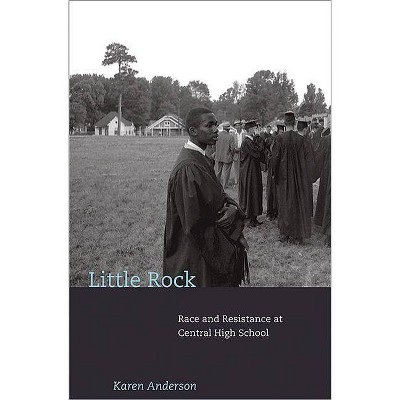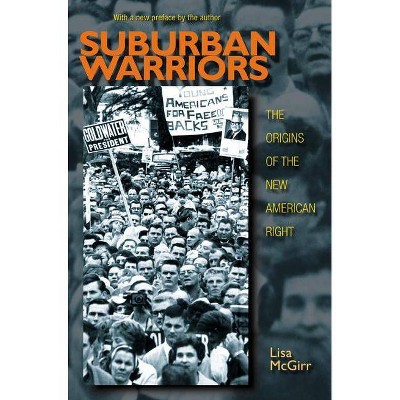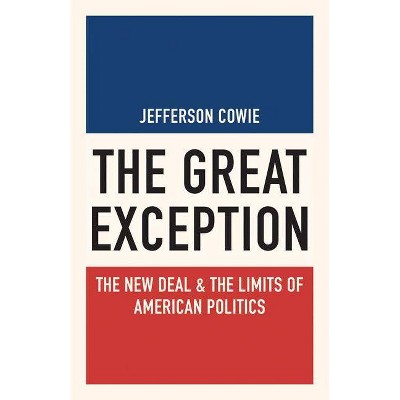Impossible Subjects - (Politics and Society in Modern America) by Mae M Ngai (Paperback)
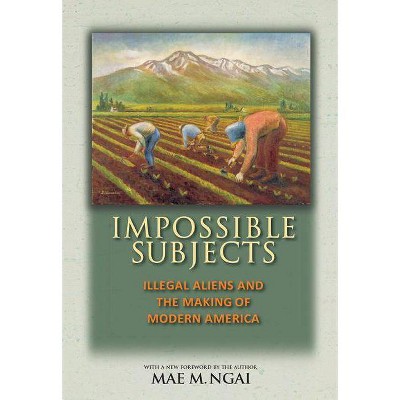
Similar Products
Products of same category from the store
AllProduct info
<p/><br></br><p><b> Book Synopsis </b></p></br></br><p>This book traces the origins of the illegal alien in American law and society, explaining why and how illegal migration became the central problem in U.S. immigration policy--a process that profoundly shaped ideas and practices about citizenship, race, and state authority in the twentieth century. Mae Ngai offers a close reading of the legal regime of restriction that commenced in the 1920s--its statutory architecture, judicial genealogies, administrative enforcement, differential treatment of European and non-European migrants, and long-term effects. She shows that immigration restriction, particularly national-origin and numerical quotas, remapped America both by creating new categories of racial difference and by emphasizing as never before the nation's contiguous land borders and their patrol.</p><p/><br></br><p><b> From the Back Cover </b></p></br></br><p>"While vernacular discussion of the so-called 'illegal alien' in the United States has generally fixed on the alien side of the equation, Mae Ngai's luminous new book focuses rather on the illegal--the bureaucratic and ideological machinery within legislatures and the courts--that has created a very particular kind of pariah group. Impossible subjects is a beautifully executed and important contribution: judicious yet impassioned, crisply written, eye-opening, and at moments fully devastating. All of which is to say, brilliant. Would that such a story need not be told."<b>--Matthew Frye Jacobson, Yale University, author of <i>Barbarian Virtues: the United states Encounters Foreign Peoples at Home and Abroad, 1876-1917</i></b></p><p>"In <i>Impossible Subjects'</i> Mae Ngai has written a stunning history of U.S. immigration policy and practice in that often forgotten period, 1924-1965. Employing rich archival evidence and case studies, Ngai marvelously shows how immigration law was used as a tool to fashion American racial policy particularly toward Asians and Mexicans though the differential employment of concepts such as "illegal aliens," "national origins," and "racial ineligibility to citizenship." For those weaned on the liberal rhetoric of an immigrant America this will be a most eye-opening read."<b>--Ramon A. Gutierrez, author, <i>When Jesus Came, the Corn Mothers Went Away: Marriage, Sexuality and Power in New Mexico, 1500-1848.</i></b></p><p>"<i>Impossible Subjects'</i> makes an outstanding contribution to U.S. histories of race and citizenship. Ngai's excellent discussions of the figure of the illegal alien, and laws regarding immigration and citizenship, demonstrate the history of U.S. citizenship as an institution that produces racial differences. This history explains why struggles over race, immigration, and citizenship continue today."<b>--Lisa Lowe, UC San Diego, author of <i>Immigrant Acts: On Asian American Cultural Politics</i></b></p><p>"At the cutting edge of the new interdisciplinary and global immigration history, Ngai unpacks the place of 'illegal aliens' in the construction of modern American society and nationality. Theoretically nuanced, empirically rich, and culturally sensitive, the book offers a powerful vista of how the core meaning of 'American' was shaped by those--Filipinos, Mexicans, Chinese, and Japanese--held in liminal status by the law."<b>--David Abraham, Professor of Law, University of Miami</b></p><p/><br></br><p><b> Review Quotes </b></p></br></br><br><i>Impossible Subjects</i> offers an important contribution to U.S. histories of race, citizenship, and immigration. This stunning history of U.S. immigration policy dispels the liberal rhetoric that underlies popular notions of immigrant America, as it establishes the designation of Asians and Mexicans as perpetual racial others. Everyone in the field of race and immigration should read this thought provoking book.<b>---Rhacel Salazar Parreñas, <i>American Journal of Sociology</i></b><br><br>'Legal' and 'illegal, ' as Ngai's book illustrates, are administrative constructions, always subject to change; they do not tell us anything about the desirability of the persons so constructed.<b>---Louis Menand, <i>New Yorker</i></b><br><br>[A] deeply stimulating work. . . . Ngai's undeniable premise--as pertinent today as ever--is that the lawfully regulated part of our immigration system is only the tip of the iceberg. Even as we have allowed legal immigrants, mostly from Europe, through the front door, we have always permitted others, generally people of color, to slip in the back gate to do essential jobs.<b>---Tamar Jacoby, <i>Los Angeles Times Book Review</i></b><br><br>Co-Winner of the 2004 First Book Prize, Berkshire Conference of Women Historians<br><br>Co-Winner of the 2004 History Book Award, Association for Asian American Studies<br><br>Honorable Mention for the 2005 Gustavus Myers Outstanding Book Award, Gustavus Myers Center for the Study of Bigotry and Human Rights<br><br>May <i>Impossible Subjects</i> indeed lead to bold changes? Ngai creates that possibility, through altering our vision of immigration history, in showing us the constructed and contingent nature of its legal regulation.<i> Impossible Subjects</i> is essential reading.<b>---Leti Volpp, <i>Michigan Law Review</i></b><br><br>Moving beyond the telos of immigrant settlement, assimilation, and citizenship and the myth of 'immigrant America, ' Mae Ngai's <i>Impossible Subjects</i> conceptualizes immigration not as a site for assessing the acceptability of the immigrants, but as a site for understanding the racialized economic, cultural, and political foundations of the United States.<b>---Yen Le Espiritu, <i>Western Historical Quarterly</i></b><br><br>Ngai has produced a valuable reinterpretation of twentieth-century American immigration history, one that will push other scholars of race, immigration, and policy in new directions as well.<b>---Charlotte Brooks, <i>Journal of American History</i></b><br><br>Ngai's book is a stunning piece of scholarship. . . . [F]or background reading of 'illegal immigration' that takes a broader view, this is an outstanding book.<b>---David M. Reimers, <i>International History Review</i></b><br><br>One of Choice's Outstanding Academic Titles for 2004<br><br>This superb book by historian Mae Ngai addresses the emergence of the legal and social category of 'illegal immigrant' in the United States. . . . Ngai addresses the subject . . . in a variety of historical contexts and each casts a different light on their deeply ambiguous condition.<b>---Linda Bosniak, <i>Journal of International Migration and Integration</i></b><br><br>Winner of the 2004 Littleton-Griswold Prize, American Historical Association<br><br>Winner of the 2004 Theodore Saloutos Book Award, Immigration and Ethnic History Society<br><br>Winner of the 2005 Frederick Jackson Turner Award, Organization of American Historians<br><br>Winner of the 2005 Lora Romero First Book Publication Prize, American Studies Association<br><br>Mae Ngai's book . . . offers a fascinating reinterpretation and critique of the United States as a mythicized 'nation of immigrants.' Ngai demonstrates the critical role that colonialism, foreign policy considerations and racial politics played in shaping U.S. immigration and national identity. . . . Ngai's book is an extraordinary contribution to U.S. immigration history and a stimulating read.<b>---Dr. Alison Pennington, <i>Planck Yearbook of United Nations Law</i></b><br><br>Ngai pulls no punches, arguing that in most cases . . . illegal [immigrants] were stigmatized by negative racial stereotypes and branded as dangerous. . . . [I]t belongs in every library and should be referenced in every ethnic studies course.-- "Choice"<br><p/><br></br><p><b> About the Author </b></p></br></br><b>Mae M. Ngai</b> is professor of history and Lung Family Professor of Asian American Studies at Columbia University. Her books include <i>The Lucky Ones: One Family and the Extraordinary Invention of Chinese America</i>.
Price History
Cheapest price in the interval: 15.99 on October 22, 2021
Most expensive price in the interval: 15.99 on November 8, 2021
Price Archive shows prices from various stores, lets you see history and find the cheapest. There is no actual sale on the website. For all support, inquiry and suggestion messages communication@pricearchive.us


